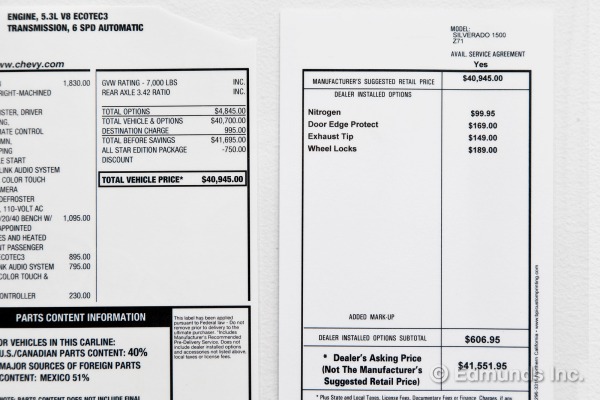
As we arrived at a car dealership to purchase a hybrid for Edmunds' long-term test fleet, we noticed a small sheet of paper posted next to the factory window sticker. It listed two dealer add-ons to the car and it caught us off guard, since we hadn't seen these additional charges when we viewed the car on the dealership's Web site.
This sheet of paper, known in the industry as the supplemental sticker, inflated the price of the vehicle by $600. Worse yet, these dealer add-ons complicated our purchase negotiations.
Common Dealer Add-Ons
The supplemental sticker lists items that offer high profits for a dealer. Common add-ons include anti-theft devices, nitrogen in tires, window tinting, chrome-plated wheels, all-season floor mats, splash guards, wheel locks, cargo trays and alarm systems. Some buyers may want these things and would be willing to pay a reasonable fee for them. But others aren't interested in these extras, which are often overpriced.
In our case, the sticker listed two add-ons: an interior protection package and an "Express Code Marking System." The interior protection package is a chemical sprayed on the vehicle's upholstery to waterproof it and protect it from stains. The dealer was charging $195 for this service. A $9 bottle of 3M Scotchgard Auto Interior Fabric Protector does the same thing.
The Express Code Marking System consists of a special label placed on key body parts of the vehicle. If removed, the label leaves the imprint of an ultraviolet identification number. The dealer was charging $400 for this product.
What makes dealer add-ons especially sticky is that sometimes the only car available in the color and trim level a buyer wants has already been outfitted with add-ons. We once were negotiating the purchase of a compact car with a $279 "Appearance package" and discovered that this was basically pinstriping. Checking around, we found that you can buy rolls of pinstriping tape for between $2 and $10 and have the project done by a professional for between $50 and $100. We ignored the extra charge and negotiated as if the pinstriping wasn't there.
A nitrogen fill for car tires is one of the newer items to appear on supplemental window stickers. Some dealers are charging upward of $100 for a service that, based on our research, isn't really worth it, especially given that plain old "air" is free.
In other cases, however, the add-ons are harder to ignore. Dealerships sometimes disable factory alarm systems, install their own and charge customers for them. Window tinting is another common add-on. A dealer might charge $395 for window tinting that you could buy in a specialty shop for $145. Yet another common add-on is the "Paint Protection package," which sold for $495 when we encountered it. We contacted the shop that performed the paint protection and learned that it's basically a wax job.
Dealing With Add-Ons
During negotiations for our hybrid car with the interior protection package and an Express Code Marking System, we told the assistant sales manager that we weren't interested in the extras.
"I'll let them know," he said, referring to his managers, "but they're going to give me some pushback on this." The assistant manager came back with a reduced price for the add-ons. Things were starting to get complicated. Now we were not only negotiating the price of the vehicle but the price of the add-ons as well.
Each offer we made brought down the cost of the add-ons, but kept us distracted from our primary goal of getting the best price on the vehicle itself. The negotiation kept going in circles, and the dealer's last offer was $300 higher than where we began, so we walked away. We eventually negotiated online and bought the car at another dealer without the add-ons, avoiding all that hassle.
How To Buy Add-ons
If the dealer add-ons are items you wish to purchase you shouldn't hesitate to do so. If you want chrome wheels or pinstriping or tinted windows and you're willing to pay extra for them, you should. If you want those items and they are already on the car, the time you will save not getting the car tinted and pinstriped on your own is certainly worth something.
But if you don't want those things, or you don't want to grossly overpay for those things, or the dealer isn't up front about their existence until you walk into the store, here are a few recommendations: